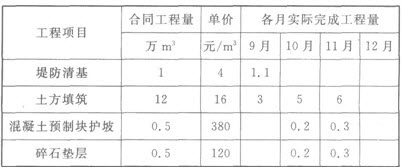【案例二】 背景 某堤防加固工程,建设单位与施工单位签订了施工承包合同,合同约定: (1)工程9月1日开工,工期4个月; (2)开工前,建设单位向施工单位支付的工程预付款按合同价的10%计,并按月在工程进度款中平均扣回; (3)保留金按5%的比例在月工程进度款中预留; (4)当实际完成工程量超过合同工程量的15%时,对超过15%以外的部分进行调价,调价系数为0.9。 工程内容、合同工程量、单价及各月实际完成工程量见下表。
 施工过程中发生如下事件: 事件1:9月8日,在进行某段堤防清基过程中发现白蚁,施工单位按程序进行了上报。经相关单位研究确定采用灌浆处理方案,增加费用10万元。因不具备灌浆施工能力,施工单位自行确定了分包单位,但未与分包单位签订分包合同。 事件2:10月10日,因料场实际可开采深度小于设计开采深度,需开辟新的料场以满足施工需要,增加费用1万元。 事件3:12月10日,护坡施工中,监理工程师检查发现碎石垫层厚度局部不足,造成返工,损失费用0.5万元。 问题:
施工过程中发生如下事件: 事件1:9月8日,在进行某段堤防清基过程中发现白蚁,施工单位按程序进行了上报。经相关单位研究确定采用灌浆处理方案,增加费用10万元。因不具备灌浆施工能力,施工单位自行确定了分包单位,但未与分包单位签订分包合同。 事件2:10月10日,因料场实际可开采深度小于设计开采深度,需开辟新的料场以满足施工需要,增加费用1万元。 事件3:12月10日,护坡施工中,监理工程师检查发现碎石垫层厚度局部不足,造成返工,损失费用0.5万元。 问题:
计算合同价和工程预付款。(有小数点的,保留2位小数)
参考答案:
合同价:1×4+12×16+0.5×380+0.5X 120=446(万元)。 工程预付款:446×10%=44 60(万元)
解析:
【解析】本案例第1问主要考查工程合同价币预付款的计算。根据工程内容、合同工程量和单价引算工程合同价:1×4+12×16+0.5 X 380+0.5× 120=446(万元);开工前,建设单位向施工单位支付的工程预付款按合同价的10%计,则工程预付款为446×10%=44.6(万元)。
